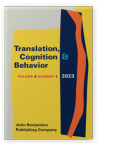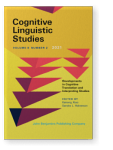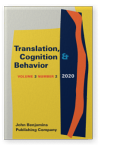Andrea Hunziker Heeb
List of John Benjamins publications for which Andrea Hunziker Heeb plays a role.
2023 Cognitive load and cognitive effort: Probing the psychological reality of a conceptual difference Translation, Cognition & Behavior 6:1, pp. 3–28 | Article
The cognitive demands associated with performing a task involve at least two dimensions: (1) the load dimension that is related to the assumed task difficulty and (2) the effort dimension that reflects the resources invested in a task. This study considers whether this distinction is actually… read more
2021 Stress, cognitive, emotional and ergonomic demands in interpreting and translation: A review of physiological studies Developments in Cognitive Translation and Interpreting Studies, Xiao, Kairong and Sandra L. Halverson (eds.), pp. 404–439 | Article
The autonomic nervous system is responsible for modulating peripheral functions in the human body and consists of sympathetic and parasympathetic branches. Its activation affects, among other things, heart rate, respiratory rate, salivation, perspiration, pupillary dilation, and blink rate. For… read more
2020 Cognitive load in relation to non-standard language input: Insights from interpreting, translationand neuropsychology Translation, Cognition & Behavior 3:2, pp. 263–286 | Article
The linguistic, psycholinguistic, and neural processes underlying simultaneous interpreting and translation have attracted widespread interest in the research community. However, an understanding of the cognitive load associated with these bilingual activities is just starting to emerge, and the… read more
2016 Investigating the ergonomics of a technologized translation workplace Reembedding Translation Process Research, Muñoz Martín, Ricardo (ed.), pp. 69–88 | Article
The modern translation workplace is characterized by intensive human-computer interaction and heavy use of language technology. In such settings, translators are subject to temporal and spatial constraints that can be mitigated or accentuated by good and poor ergonomic design, respectively. In the… read more



